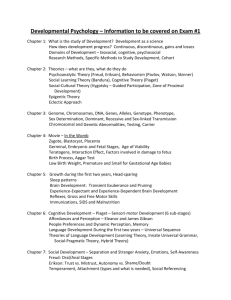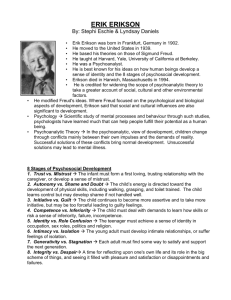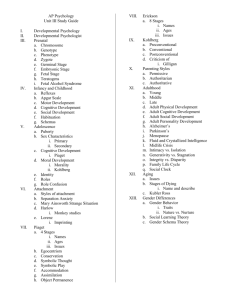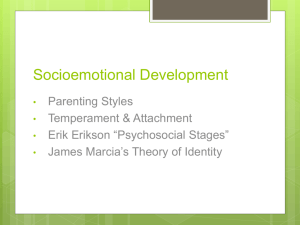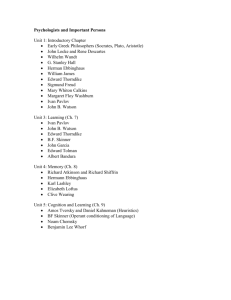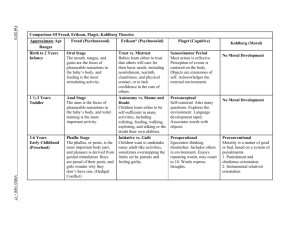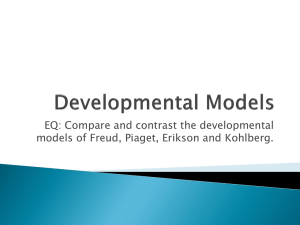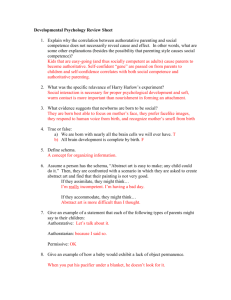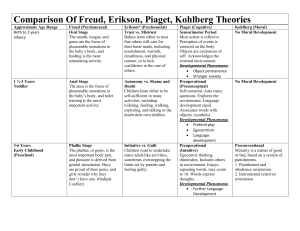From Freud to Brazelton: 100 Years of Child & Parenting
advertisement
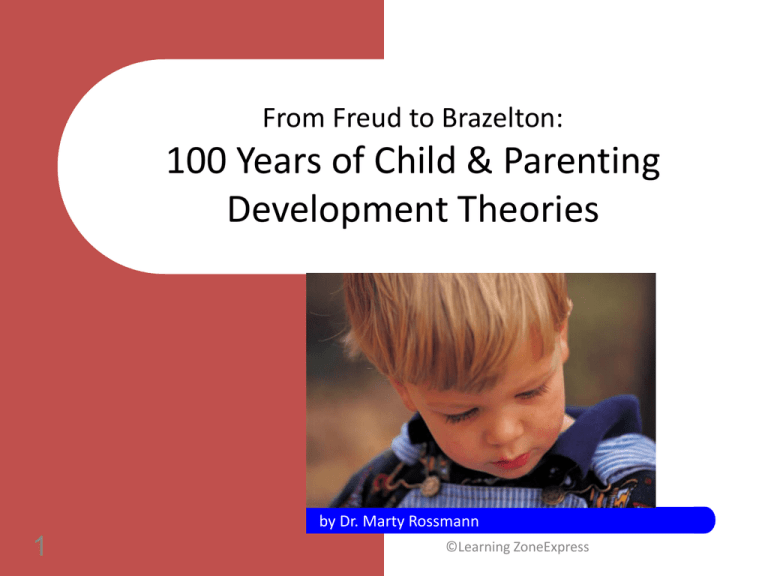
From Freud to Brazelton: 100 Years of Child & Parenting Development Theories by Dr. Marty Rossmann 1 ©Learning ZoneExpress Why Study Child & Parenting Development Theories? • Theories help people: – Organize their ideas about raising children. – Understand influences on parenting. – Discover more than one way to interact with children. – Analyze the benefits and consequences of using more than one theory. ©Learning ZoneExpress Sigmund Freud • Erik Erikson • Maria Montessori Jean Piaget • Urie Bronfenbrenner • Lev Semenovich Vygotsky Abraham Maslow • Arnold Gesell • John Bowlby • Rudolph Dreikurs Lawrence Kohlberg • B.F. Skinner • Benjamin Spock 2 Diana Baumrind • T. Berry Brazelton • Howard Gardner Sigmund Freud (1856-1939) Psychoanalytic Theory The unconscious is the source of motivations. • Individuals go through stages in childhood and adolescence that shape their adult personality. • Behavior is influenced by the unconscious mind. • Early experiences affect development in later life. ©Learning ZoneExpress 3 Sigmund Freud (1856-1939) Psychoanalytic Theory The unconscious is the source of motivations. The personality development of a child is complex. • Psychic Life Functions: – ID - present at birth; directs need gratification; pleasure seeking; and pain avoidance. – EGO - Responsible for contact with day to day reality; predicts probable outcomes of behavior choices. – SUPEREGO - Internal interpretation of the rules and values of the environment. ©Learning ZoneExpress 4 Sigmund Freud (1856-1939) Psychoanalytic Theory The unconscious is the source of motivations. • Defense Mechanisms: – Repression - pushing depressing matters out of consciousness. – Sublimation - substituting acceptable ways of expressing feelings. – Regression - returning to an earlier way of adjusting to problems. – Compensation - substituting success in one area for failure in another. – Rationalization - giving a socially accepted reason for a behavior that was not socially acceptable. – Escape - leaving a distressing situation, either physically or psychologically. ©Learning ZoneExpress 5 Erik Erikson (1902-1994) Psychosocial Theory There are stages of psychological development. • Focus is on: – Developing a healthy personality. – Humans develop throughout their life span in eight stages. – Individuals need to develop identity at each stage. – Culture is a part of a person’s socialization. – If an individual does not achieve a stage, the consequences may be alterable later in life. ©Learning ZoneExpress 6 Erik Erikson (1902-1994) Psychosocial Theory There are stages of psychological development. • Psychosocial Stages: – Trust vs. Mistrust (0-12 to 18 mos.) • Infant forms a loving, trusting relationship with parent or is frustrated and lacks self-confidence. – Autonomy vs. Doubt (18 mos. to 3 years) • Child needs to develop self-control with firm, gradual and kindly support of parents so the child does not lose self-esteem. – Initiative vs. Guilt (4-6 years) • Child gains skill in language and exploring and needs guidance from parents to proceed in life in a selfconfident, guilt-free way. ©Learning ZoneExpress 7 Erik Erikson (1902-1994) Psychosocial Theory There are stages of psychological development. • Psychosocial Stages: – Industry vs. Inferiority (7-12+ years) • Child pursues and completes activities that produce something and gain recognition from parents, teachers and friends. Failure makes the child feel inadequate and inferior. – Identity vs. Role Confusion (12-18 years) • The sense of “who I am” and what part I play in society (occupation, politics, sex roles, religion, etc.) is determined. Parents have new expectations for the adolescent. Those who don’t develop effective steps toward a tangible future may be insecure, confused and lack self-esteem. ©Learning ZoneExpress (There 8 are more stages for adults, not shown here.) Jean Piaget (1896-1980) Cognitive Development Theory Understanding & supporting a child’s learning. • Two processes are essential for development: – Assimilation • Learning to understand events or objects, based on existing structure. – Accommodation • Expanding understanding, based on new information. ©Learning ZoneExpress 9 Jean Piaget (1896-1980) Cognitive Development Theory Understanding & supporting a child’s learning. • Sensorimotor (Birth – 2 years) – – – – – Learning about world through 5 senses (see, feel, hear, smell & taste). Learning to control and manipulate muscles (small & large motor skills). Learning about self (egocentric). Learning from trial and error (12-18 months). Thinking about how to do something without actually doing it. • Preoperational (2-7 years) – – – – Learning by using language and mental images. Learning to internalize thought process. Continuing to be egocentric. Learning by watching and performing. ©Learning ZoneExpress 10 Jean Piaget (1896-1980) Cognitive Development Theory Understanding & supporting a child’s learning. • Concrete Operational (6 or 7-12 years) – Learning to understand someone else’s point of view. – Learning to resolve problems with logic. – Learning conservation (amounts of liquid remain the same, even if the shape changes). • Formal Operations (13 years – adult) – Thinking logically, abstractly, and hypothetically. – Testing theories by hypotheses. – Understanding right vs. wrong. – Glimpse of complexity of knowledge in teens leads some to believe they understand nothing and others to believe they are on the verge of understanding everything. ©Learning ZoneExpress 11 Lev Semenovich Vygotsky (1896-1934) Socio-Cultural Theory Culture & experiences play a role in a child’s learning. Patterns and ways of learning are outcomes of the practices experienced by the child in the culture where the child grew up. • Five Step Process: – Step 1 - Adult provides tools, modeling, guidance, interaction and encouragement. – Step 2 - Child performs task under adult guidance and adult asks appropriate questions and expands on the child’s responses. – Step 3 - Adult helps child develop tasks into smaller segments and assesses child’s understanding. – Step 4 - Adult provides the “scaffolding” (support) necessary in a learning situation. – Step 5 - Adult guides child into new situations by having child transfer familiar knowledge to the unfamiliar. ©Learning ZoneExpress 12 Abraham Maslow (1908-1970) Human Needs Theory Human needs influence each person’s development. • Influence of a hierarchy of human needs on personality. • Lower need must be filled before upper-level needs receive attention. • Child’s genetic potential will not flourish unless they are nurtured by adults as the child grows. ©Learning ZoneExpress 13 Maslow’s Hierarchy of Needs Need to maximize one’s potential. Need for self-respect and self-esteem and for the esteem of others. Need for community, family, friends, lover, affection & intimacy. Need for security, stability, freedom from fear, structure & order. Need for shelter, food, clothes, air, sleep, and activity. Lawrence Kohlberg ( 1927-1987) Moral Development Theory Identifies steps toward character development. • Children are moral philosophers. • Children experience a series of predictable stages in their moral reasoning. • Levels of Moral Development: – Level 1 – Preconventional (4-10 years) Decisions are based on consequences. • Stage 1 - Children respond to threat of punishment. • Stage 2 - Children learn that correct action brings reward. ©Learning ZoneExpress 15 Lawrence Kohlberg ( 1927-1987) Moral Development Theory Identifies steps toward character development. – Level 2 – Conventional (10 years and older) Decisions are based on social rules and expectations. • Stage 3 - Children are concerned about other’s opinions and that “good” behavior pleases others. • Stage 4 - Law and order are important. – Level 3 – Postconventional (some adolescents and adults) Decisions are based on personal ethics of what is morally right. • Stage 5 - Moral decisions are made through understanding that society’s rules are for everyone and were made by consensus. • Stage 6 - Universal principles determine right from wrong. ©Learning ZoneExpress 16 B.F.Skinner (1904-1990) Operant Conditioning Theory Role parents play in shaping child’s behavior. • Emphasizes the role of the parent in reinforcing (rewarding) the child’s behaviors. • Consequences of a behavior lead to changes in its frequency. • Behavior patterns will change if the child is rewarded, ignored or punished. ©Learning ZoneExpress 17 B.F.Skinner (1904-1990) Operant Conditioning Theory Role parents play in shaping child’s behavior. • Conditioning functions: – Shaping behavior - reinforcing a behavior “close” to the desired behavior. – Chaining behavior - linking together a series of small steps toward the desired behavior. • Consequences include: – Positive reinforcement - something that causes an act to increase in the future, i.e. a child smiles and gets a hug. – Negative reinforcement - child causes unpleasantness to cease, i.e. parents “lecture” stops when child cleans room. – Punishment - unpleasant act by parent discourages behavior in the future, i.e. T.V. privileges taken away. ©Learning ZoneExpress 18 Diana Baumrind (1926- ) Parenting Styles Theory The way parents set limits and love their children. • Permissive: – Parent accepts the child’s wishes and is passive in discipline. – Parent makes few demands on child. – Child may wonder if the parent cares about them. • Authoritarian: – Parent values obedience. – Parent teaches respect for work, others, and order. – Parent shapes, controls and evaluates behavior of child with set of conduct rules. – Child may feel anger; and be resentful of parents. ©Learning ZoneExpress 19 Diana Baumrind (1926- ) Parenting Styles Theory The way parents set limits and love their children. • Authoritative: – Parents encourage verbal give and take. – Parents provide firm limits with love and support. – Parents affirm child’s good attributes. – Child feels cared about and knows family rules are consistently enforced. ©Learning ZoneExpress 20
